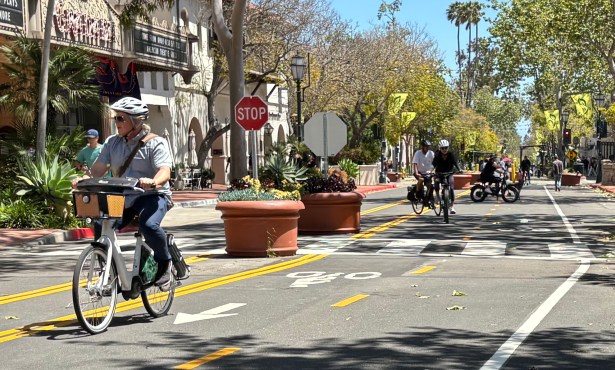Imprisoning Families for Profit
Immigration Policies that Jail Women and Children Not a Solution
The door locked behind me. Through the narrow window in the next locked door, I saw 10-year-old Ana and 9-year-old Victor, both bouncing with excitement. As soon as I stepped through the door, four small arms wrapped around me, holding on for dear life. Our hugs were interrupted by a guard, who told me that the children needed to sit down on their own chairs.
I was in Texas at the Karnes County Residential Center, a detention facility that locks up women and children who have been apprehended crossing our southern border without permission. Ana and Victor are from El Salvador, and along with their mother, Alta Gracias, and their 2-year-old brother, Martín, they have been held at the Karnes detention facility for over two months. I have known these children their whole lives: Their mother and I have been friends for 15 years since we first met when we were both 18, and I was volunteering as an English teacher at her rural high school in Southeastern El Salvador. I lived in Alta’s rural village from 2001-2005, and since then have been back to visit every year. As the years passed and her children grew up, Alta worried about raising her children in an environment rife with extreme poverty and violence. She told me she was afraid her daughter’s pretty face and her son’s rambunctious spirit would get them into trouble. So she did what any good parent would do: look for a brighter future for her children. Because her husband was already in the United States, it seemed like the best option, despite the hazardous journey.
Many mothers have made similar decisions, fleeing endemic poverty and violence with their children and seeking refuge in the United States. Children who cross the border with their parents are subject to mandatory detention in specialized family detention centers like Karnes, which holds 550 detainees: pregnant women and mothers with children as young as two months old. They are held in these facilities while they go through the slow legal process of determining whether they have a possible asylum case or not. Only after they have convinced immigration judges of a threshold asylum claim may these families petition to be released from detention on bond while awaiting further hearings. However, the Department of Homeland Security has recently taken a position opposing bond for all of these women and children, arguing that they constitute an indirect national security threat.
Even if Alta is eventually released on bond, she has been told that the process of preliminary hearings could take up to six months. That means four more months of incarceration, of institutional schedules, of heavily processed food, of sharing a living space (four bunk beds, one shower, and one toilet) with two other families. Alta and her children are already suffering the consequences of their incarceration: 10-year-old Ana has angry outbursts or fits of sobbing almost every day, 9-year-old Victor has become sullen and withdrawn, and 2-year-old Martín takes out his frustration by hitting other children. Alta cannot sleep. All of them have lost weight.
The experiences of Alta Gracias and her children are not unique. In a recent report, the ACLU stated: “History shows us that imprisoning families limits access to due process, harms the physical and mental health of parents and children, and undermines family structure by stripping parents of their authority.” The United Nations also opposes the incarceration of children: “[D]etention of children on the sole basis of their migration status or that of their parents is a violation of children’s rights, is never in their best interests and is not justifiable.”
Nevertheless, the mandatory detention of families continues to be the administration’s response to increasing migration from Central America. The detention centers where women and children are locked up are all run by private corporations like Geo Group and Corrections Corporation of America (CCA). For these corporations, which each have annual revenues of over $1.7 billion, the increase of refugees from Central America presents a new source of profit. Through their powerful Washington lobbies, which have spent over $45 billion in the last decade, these corporations have sold for-profit detention as the solution to the border crisis.
As a result of this lobbying, for-profit incarceration of immigrant women and children is increasing sharply. On September 22, the Department of Homeland Security announced plans to open a new center in the remote town of Dilley in south Texas. The facility, operated by CCA and slated to open in November, will have beds for 2,400 women and children, making it the largest immigrant detention facility in the nation. In addition to the new detention facilities in Karnes, TX, and Artesia, NM, this plan increases family detention from 90 beds to almost 4,000 beds since June of this year. This rapid expansion means that many more families like Alta Gracias and her children will be incarcerated in the largest trend of family detention since the internment of Japanese Americans during World War II.
At the end of our visit, Ana wanted to know when I would be coming to visit them again. Alta Gracias told me the little girl had thought I would be staying with them for several days, as I always did when I visited them in El Salvador. Ana had been worried that there wasn’t enough space for me in their crowded living quarters. For my part, I had been worried that the children would ask to go with me when I left. But they didn’t, and in some ways that silence was even more devastating. It suggested that they children had started to think of prison as the normal place for them to be. As I walked free at the end of the day, leaving Alta Gracias and her children behind, I was weighed down by the knowledge that legacies of trauma from these experiences of imprisonment will continue to lay claim to ever more children until we end the practice of family detention.
Join concerned Santa Barbarans at the Hope for the Holidays greeting card-making event at the Unitarian Church on Sunday, December 7, noon-3 p.m. The cards go to women and children in custody in the hope of bringing a small bit of cheer to their life behind bars. A potluck, documentary on detention, and letter-writing opportunities will also be presented. Contact Bjorn Birnir at (805) 893-4866 for more information. The Unitarian Church is at 1535 Santa Barbara Street.
The individuals’ names in this piece have been changed to protect their privacy. Lynette Arnold is a graduate student in the Department of Linguistics at University of California, Santa Barbara.



